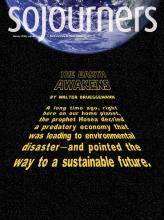GROWING UP, my pop culture heroes were all nerds. I gravitated toward the quippiest, smartest characters I could find; misunderstood geniuses with an arsenal of world-saving ideas and killer one-liners, who swaggered off awkwardly into the sunset, toting books the same way Clint Eastwood did his gun.
These characters are still important to me, but here’s the problem: Nearly all of them were men. In idolizing Ghostbusters’ Egon Spengler and Jurassic Park’s Ian Malcolm, I grew up thinking that, if I wanted to be like them, I had to reject all things girl. It took me a long time to realize I could be cool and smart and feminine.
Movies and TV teach us to love good guys and hate bad guys. But when heroes only look a certain way, says writer and Pepperdine University professor Craig Detweiler, we come to believe certain population groups are the only ones who can inhabit those roles. “Movies paint people in ... stark categories, and those categories transpose into everyday life,” Detweiler said in an interview with Sojourners. “If you only see one kind of hero, you only have one kind of heroic role model.”
A narrow definition of heroism is as much a race issue as a gender issue. Leslie Foster, a black filmmaker, says he’s often grappled with the impact popular culture has on what society deems normal.
“I’ve realized that it had an effect on what I found aesthetically attractive, and I’ve had to untangle that as an adult,” Foster told Sojourners. “I tell people to look at the makeup aisle, and see what colors get categorized as ‘nude.’ It’s always white.”
The power to change minds
The stories we encounter can reinforce or damage how we see ourselves, and how we categorize others. When done well, they can encourage understanding between different races, genders, or sexual orientations. Research into parasocial relationships (the feeling of emotional attachment to fictional characters) and intergroup contact theory (the idea that ethnically diverse social relationships decrease prejudice) has shown that good representations of these groups in TV and film positively affect viewers’ opinions of them.
Read the Full Article

